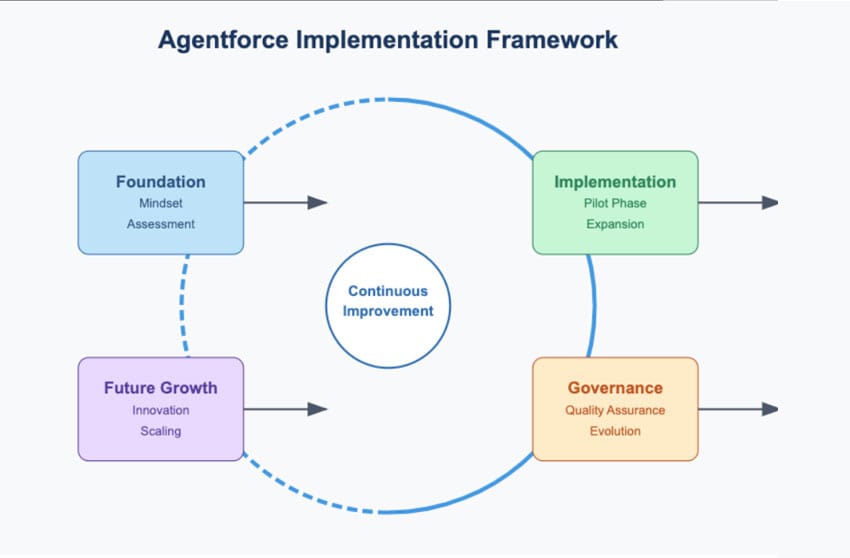Implementing Agentforce represents a fundamental shift in how organizations operate and deliver value. This roadmap provides a strategic framework for organizations embarking on their Agentforce journey, focusing on the key elements that drive successful implementation and adoption.

Building the Foundation
Organizational Mindset
Success with Agentforce begins with cultivating the right organizational mindset. Teams need to move beyond viewing AI as just another tool and instead see it as a collaborative partner in achieving business objectives. This mindset shift requires active engagement from both leadership and team members throughout the organization.
Executive teams must champion a culture where AI and human capabilities complement each other. This means fostering an environment where teams feel empowered to experiment with new ways of working, share learnings openly, and challenge existing processes. The focus should be on continuous learning and adaptation rather than perfect execution from day one.
Different groups within the organization will need varying levels of support and engagement. IT teams should focus on building expertise in AI capabilities while developing new security frameworks and creating scalable integration approaches. Meanwhile, business users need to embrace AI as a collaborative tool, identifying automation opportunities while developing a clear understanding of AI's capabilities and limitations.
Implementation Framework
Assessment and Planning
Understanding your organization's current state and capabilities is crucial for success. This begins with comprehensive process mapping, paying particular attention to customer interaction points and decision-making workflows. Consider how data flows through your organization and where handoffs occur between systems and teams.
Your data landscape requires careful evaluation. Organizations often underestimate the importance of data quality and accessibility in AI implementations. Key considerations include:
- Data quality and completeness across systems
- Integration capabilities with existing platforms
- Security and governance frameworks
- Current knowledge management practices
Building for Success
The path to successful implementation starts with choosing the right initial projects. Rather than attempting to transform everything at once, focus on implementations that deliver clear business value and have well-defined processes. These early projects should offer measurable outcomes while providing valuable learning opportunities for the organization.
Knowledge management becomes increasingly critical in an AI-enabled organization. Create a robust knowledge infrastructure by systematically documenting tribal knowledge and establishing clear maintenance procedures. This foundation will determine how effectively your AI agents can access and utilize organizational knowledge.






